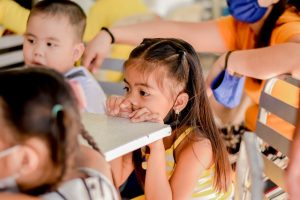
Grade 2 Homeschool Curriculum
A well-rounded education starts with choosing an age-appropriate curriculum for home schooling year 2. To encourage learning and academic performance, tailor the learning experience to the child’s developmental stage.
Year 2 homeschooling requires an age-appropriate curriculum, which Thomas Keith School understands. We mix academic rigour with engaging activities that engage children’s curiosity and interests. English, Math, Science, and Social Studies are taught alongside creativity and critical thinking.
Students read more challenging literature and write in English. We emphasise reading comprehension and vocabulary, which are essential for academic success.
Math classes stress problem-solving and real-world applications. Math is fun and understandable with manipulatives and interactive exercises.
This level’s science teachings focus on nature and small experiments. I am observing and asking to foster a scientific mentality that prepares students for future research.
Year 2 social studies covers cultures, communities, and geography. Interactive projects and virtual tours enhance learning and promote global understanding and diversity.

Thomas Keith School promotes holistic education. Thus, we teach art, music, and PE. These subjects foster creativity and self-expression while improving a child’s well-being and character.
Our flexible Year 2 homeschooling curriculum meets national educational standards. We urge parents to customise the programme to their child’s learning style.
Thomas Keith School helps Year 2 parents foster a love of learning by delivering an age-appropriate, well-structured curriculum.
Structured Year 2 Home Schooling Routine
Year 2 homeschooling relies on a regimen. It gives them security, consistency, and a sense of accomplishment. Thomas Keith School recommends a balanced academic and recreational schedule to promote a child’s growth and development.
A cheerful morning ritual starts our recommended day routine. We recommend a healthy breakfast and a short mindfulness or gratitude activity. This helps kids focus and build confidence before starting school.
Breaks should separate short, focused academic units. For Year 2 home schooling, we recommend teaching essential subjects like English and Math in the morning when kids are most attentive.
Lunchtime allows family connection after a productive morning. Sharing and relaxing meals can enhance family bonds and allow for casual discussion.
Play-based learning after lunch helps kids develop holistically. Thomas Keith School believes play fosters creativity, inventiveness, and problem-solving. Encourage your youngster to play freely, explore nature, or make crafts.
In the afternoon, study science, social studies, and extra languages. It’s important to read together and alone at night. Reading develops linguistic abilities and a love of reading and learning.
Physical activity is essential after school. Outdoor activities, sports, and family walks are examples. Exercise helps kids focus and stay healthy.
To get enough sleep, set a nighttime routine. Children’s growth and cognitive development depend on good sleep.
Every child is different, so be flexible and alter the routine to their needs. Thomas Keith School encourages parents to help their children create the daily plan, giving them ownership and responsibility for their learning.
Year 2 homeschooling can optimise a child’s development and well-being with a planned daily routine.
Play-Based Learning in Year 2 Homeschooling
Play, the language of childhood helps improve Year 2 homeschooling. Thomas Keith School promotes play-based learning that blends education and pleasure to inspire a love of learning in children.
Play-based learning in Year 2 homeschooling begins with recognising play’s educational potential. Play helps kids discover, experiment, and understand the world. Play-based lessons make learning fun and participatory.
English plays with the imagination. Role-playing games let kids act out storylines and characters. Language, creativity, and empathy improve.
Games and puzzles help math. Building blocks, board games, and counting games teach math and problem-solving.
Experiments and exploration bring science to life. Thomas Keith School encourages pupils to do simple science projects at home to awaken their curiosity and scientific inquiry.
Cultural recreation and virtual travel enrich social studies. Teach your child about diverse cultures and countries by preparing international dishes and virtual exploring iconic places.
Play-based learning involves art and music. Encourage art-making. Music and rhythm activities improve cognition and teach patterns and sequences.
Play with your child to participate in play-based learning. Allow your child to lead activities. This bonds you and shows your youngster that learning is fun.
Play-based learning in Year 2 homeschooling demands an exploratory setting. Thomas Keith School recommends a home play and learning environment. Age-appropriate toys, literature, and creative and curious objects should be in this place.
Play-based learning is fun and educational. During playtime, watch your child for learning opportunities and gently guide them.
Play-based learning makes Year 2 homeschooling at Thomas Keith School fun and engaging, encouraging lifelong learning.

Year 2 Learning Progress and Milestones Homeschooling
Thomas Keith School Year 2 homeschoolers must evaluate learning progress and milestones. Parents can personalise a child’s learning experience for maximum growth and success by regularly assessing academic strengths and weaknesses.
Thomas Keith School assesses learning progress using multiple methods. It uses formal and informal ways to comprehend a child’s growth fully.
Year 2 homeschooling includes frequent evaluations, quizzes, and standardised examinations. These tests measure a child’s academic proficiency and establish age-appropriate benchmarks.
Formal English examinations may include reading comprehension tests, writing samples, and spelling quizzes. Mathematical reasoning and problem-solving can be assessed.
Science and social studies tests sometimes include projects and hands-on exercises to demonstrate a child’s learning.
Formal and informal assessments are both necessary. Understanding a child’s learning journey requires observation. Parents may see their child’s interest, excitement, and comprehension during classes and activities.
Parent-teacher-child communication is also crucial. Talking about a child’s progress, struggles, and successes helps.
A portfolio assessment is also helpful at Thomas Keith School. It entails archiving a child’s work samples, projects, and creative pursuits. Portfolios reflect a child’s advancement throughout subjects.
Thomas Keith School values progress over perfection. It’s important to recognise each child’s progress, no matter how modest. Positive reinforcement and encouragement inspire children to learn.
Parents should also balance assessments with a caring setting. Instead of pressuring a child to perform, encourage learning.
Year 2 home schooling at Thomas Keith School is dynamic and individualised, encouraging children to succeed academically and beyond.
Homeschooling Multiple Grades, Including Year 2
Homeschooling multiple grade-level children may be gratifying and challenging. Thomas Keith School understands the value of personalised attention and a conducive learning environment for everybody. Homeschooling many grade levels, including Year 2, requires these practical ideas.
- Flexible routine: Create a daily routine that meets each child’s needs. While some courses may be taught jointly, give each kid individual time to handle grade-level needs.
Find cross-grade learning opportunities. Older children can learn historical context, while smaller ones focus on the primary narrative.
- Cooperative Learning: Have older children help younger siblings with responsibilities. This boosts knowledge, accountability, and sibling connections.
- Independent Learning Time: Let older kids work on homework alone while you teach Year 2. This improves self-reliance and time management.
Plan group activities for all your kids. Science, art, and outdoor activities can be modified for different ages.
- Use Technology Wisely: Supplement your instruction with educational Technology and online resources. Interactive educational games and movies accommodate diverse learning styles and levels.
Buy grade-appropriate learning resources for each child. They can benefit from customised textbooks, workbooks, and online courses.

- Peer Learning: Hold study sessions or learning circles with other homeschooling families. Peers and experiences can teach kids.
Use a planner or digital tool to track each child’s progress, assignments, and accomplishments. Organising keeps kids on track and helps you stay balanced.
Quality time is essential when homeschooling many children. Communicate and connect emotionally.
- Be Flexible and Patient: Homeschooling grows kids and parents. Be flexible and patient with yourself and your kids.
Even with many children in different grades, Thomas Keith School believes homeschooling can be rewarding and successful. These strategies might help you create a nurturing and productive learning environment for all.





